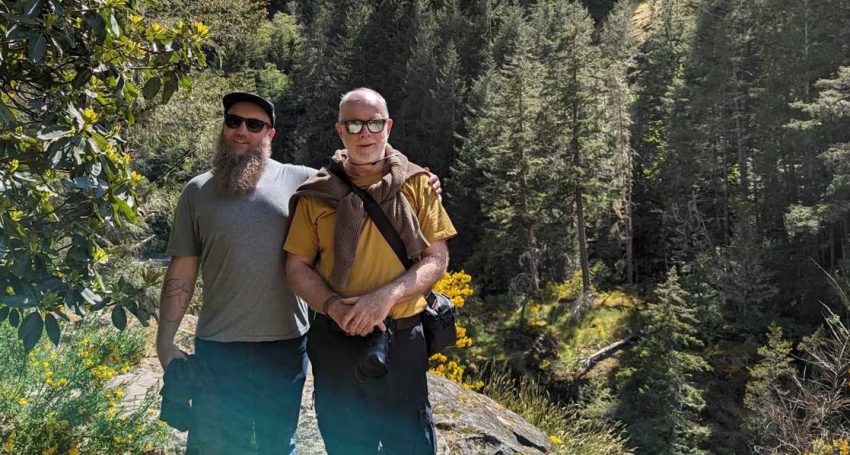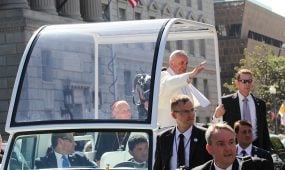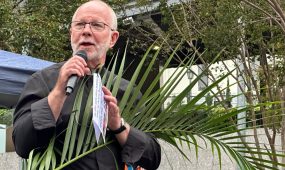"In politics the tail often wags the dog"
Reflections
“Canadians are incredibly gracious drivers. Even those who drive the most ridiculously large utes stop on a dime to let people cross the road — even in places where there is no pedestrian crossing. Italian traffic looks to be incredibly chaotic. It in fact operates under two very important rules that are obeyed to the letter: 1. Go as fast as you can. 2. Do not hit anybody,” says The Very Rev’d Dr Peter Catt

Brisbane International Airport
Flight to Dubai now boarding at Gate 67
رحلة إلى دبي الآن على متن البوابة 67
Dubai International Airport
رحلة إلى بولونيا الآن على متن الطائرة
Welcome to..
Il volo a Bologna sta imbarcandosi
The flight to Bologna is now boarding
الرحلة إلى بولونيا على متن الطائرة الآن
Bologna International Airport
Benvenuti…
Welcome to..
Il volo a Londra sta imbarcandosi…
The flight to London is boarding…
Heathrow International Airport
Welcome to..
Benvenuti a Londra…
Bienvenue à..
The flight to Vancouver is boarding….
le vol vers Vancouver est en cours d’embarquement…
Vancouver International Airport
Welcome…
Bienvenue à..
The flight to Los Angeles is boarding….
le vol vers Los Angeles est en cours d’embarquement…
Los Angeles International Airport
The flight to Brisbane is now boarding….
le vol vers Brisbane est en cours d’embarquement
El vuelo a Brisbane está abordando…
Brisbane International Airport
Welcome to Brisbane, your bags will be available on Carousel 7
Having been through four countries in the past month, with longer stays in two, several things have struck me as I return home.
Firstly, Australian drivers are way more aggressive than those I encountered in Italy and Canada. The difference is so stark that I am examining very closely my own driving style.
Canadians are incredibly gracious drivers. Even those who drive the most ridiculously large utes stop on a dime to let people cross the road — even in places where there is no pedestrian crossing.
Italian traffic looks to be incredibly chaotic. It in fact operates under two very important rules that are obeyed to the letter:
- Go as fast as you can.
- Do not hit anybody.
Despite appearances Italian drivers are not aggressive. Unlike Canada where the car stops long before you are near the pedestrian crossing, in Italy one has to step bravely into the flow of traffic to get the traffic to stop. If one does not take the step into the roadway, you will be waiting at the edge of the road forever. If, however, you do step into the roadway, the traffic will immediately stop. Every time. Refer to rule 2.
Advertisement
Within a few hours of being home I was reminded of the Australian tendency to sneak around corners to beat people crossing with the lights, and twice on the first day home I saw and heard cars accelerating when approaching pedestrians crossing a road in a place without lights.
The second thing I have noticed since being home is what I am not hearing.
The public spaces in the UAE, Italy, the UK, Canada and the USA — from airports and public transport, to the soundtracks on electronic billboards — were awash with the sounds of different languages. Most information is conveyed in at least two languages — in LA, at least three.
Australia’s public spaces are almost universally monolingual. Even our airports.
This monoculture contrasts with our reality.
My first official duty on my return was to attend the annual Lord Mayor’s Prayer Breakfast.
The proceedings began with the National Anthem led by the choir of Brisbane State High. The choir was made up of a kaleidoscope of faces from different ethnic and language groups. The keynote address was given by the CEO of Multicultural Australia who reminded us that 70 per cent of Australians were either born overseas or have a parent who was. Her address was a celebration of our reality, our diversity and the richness that comes from our melting-pot existence.
Advertisement
Listening to the keynote address led me to identify the third thing that I have noticed since returning home, the dissonance between who we say we are and what our political discourse reveals about us.
At the Lord Mayor’s Prayer Breakfast we sang a dissonant note as we launched with gusto into verse two of the National Anthem:
… for those who come from across the seas we have boundless plains to share..
The National Anthem and keynote address’ description of our reality stand in direct contrast to what the current political stoushes about immigrants and the talk, once more, of reducing their numbers say about us.
It is a well-used and successfully used trope in Australian political discourse to blame immigrants — the Chinese, the Germans, the Italians, the list goes on — for the ills that beset our nation.
In the current iteration, immigrants are being blamed for the housing crisis. And yet there is no mention of the contribution to that crisis made by the investor owners of the 25 per cent of apartments in the Brisbane CBD that are being deliberately kept empty because the tax regime allows them to make money that way and favours investors over owners.
The ABC analyst, Laura Tingle, got herself into hot water this past week by describing Australia as a “racist country”. Our monolingual public spaces and political discourse suggest that there are likely to be some societal-structural issues that at least make this appear to be the truth. It also reveals the heart of those to whom the political class wish to speak and to activate. In politics the tail often wags the dog.
As well as using choirs with multicultural faces and celebrating the work of organisations like Multicultural Australia one more thing I have noticed that is moving us in the opposite direction to that unmasked by the political discourse is that advertising industry’s use multi-racial faces and accents. That industry has begun reflecting back to us who we really are.
One of the hallmarks of the our life at St John’s is that we seek to be inclusive and to celebrate diversity. One of the things I rejoice in is the changing nature of the demographic of the Cathedral community. Like the choir of Brisbane State High our congregations are slowly but surely coming to reflect the diversity of the Australian population and of the population who live in the vicinity of the Cathedral in particular. The wider Diocese, particularly through the gift of our First Nations, Sudanese and Korean friends, is also being enriched by the diversity of humanity that “Call Australia Home”.
First published in the Cathedral Precinct eNews on 3 June 2024.





